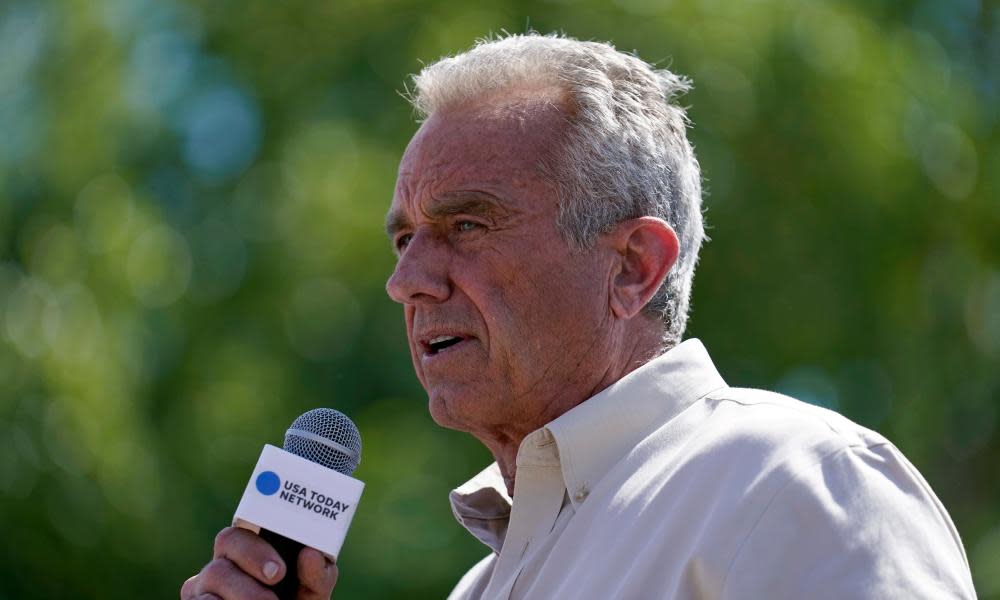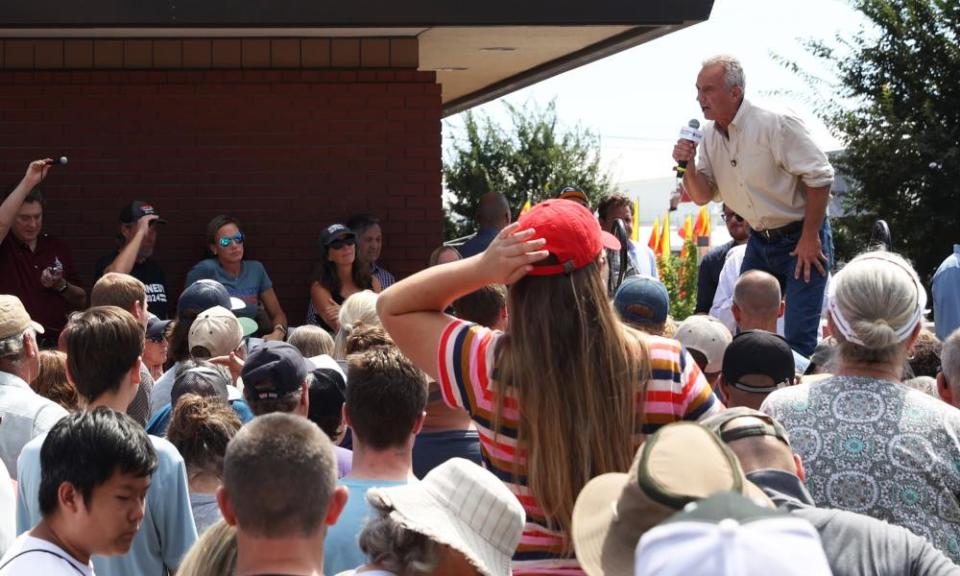RFK Jr draws quite a crowd – what does it mean for 2024?

Wearing a Robert Kennedy Jr campaign T-shirt, Kevin O’Keeffe found there was standing room only as the candidate, introduced as “Bobby Kennedy”, walked on a sunbaked stage decked with hay bales to whoops and applause.
“He supports freedom of speech, and he’s questioned the efficacy of the vaccine, which is legitimate at this point,” said O’Keeffe, 52, who works for a telecommunications company in Sioux Falls, South Dakota. “I like his views on foreign policy and keeping us out of the war. He cares about his fellow Americans in a way that a lot of the politicians nowadays I don’t think really do.”
He was far from alone in rooting for Kennedy at the Iowa state fair in Des Moines last weekend. The longshot challenger to Joe Biden for the Democratic nomination in 2024 drew one of the biggest and most energetic crowds, outnumbering conventional politicians on the Republican side. The shouts of “We love you, Robert!” and “Thank you, Robert!”, and subsequent mobbing of Kennedy for handshakes and selfies, hinted at the stirrings of a movement.
Related: Robert F Kennedy Jr’s campaign bankrolled by Republican mega-donor
In a nation that has seen plenty of political convulsions over the past decade, Kennedy, a 69-year-old environmental lawyer who has never before run for public office, is proof that Americans’ appetite for insurgents and outsiders, mavericks and populists, remains undimmed. Even when a campaign traffics in anti-vaccine conspiracy theories and has been hit by antisemitism scandals.
Kennedy rose to prominence during the coronavirus pandemic because of his strident and widely condemned opposition to vaccines. He has styled himself as a hammer of the elites – quite a feat for a scion of one of America’s most storied political dynasties. He has scrambled old political allegiances, striking an anti-establishment nerve on the far left and far right over the Ukraine war and other issues.
Brandy Zadrozny, a senior reporter for NBC News, summed up his supporters as “anti-vaxxers, conspiracy theorists, internet contrarians, billionaire tech bros, Camelot nostalgists and rightwing provocateurs who seem to be pumping Kennedy as a spoiler candidate”.
In his speech from the Des Moines Register newspaper’s political soapbox, Kennedy wore blue jeans and a white shirt with rolled-up sleeves. He spoke of his father, former attorney general Robert Kennedy, and uncle, President John F Kennedy, as figures from a golden age when America was the envy of the world.
His campaign chairman, Dennis Kucinich, held up a map as Kennedy railed against proposed pipelines that would run through Iowa to transport liquefied carbon dioxide away from ethanol plants for burial underground. It was a retro, 20th-century presentation but more locally targeted than many candidates offered.
Such is the celebrity-style clamor for Kennedy that, for an interview with the Guardian, he slipped away from the crowds and sat in the back of a black limousine with security detail present. Kucinich, a former congressman and past presidential contender, offered to take an Uber back to the hotel but Kennedy insisted that he climb in too, then asked an aide for some fried bacon from the fair.
His uncle, Ted Kennedy, was once floored by the simple question, “Why do you want to be president?” This Kennedy does have an answer for that one: “I’m running for president because I feel like I’m losing my country and because I feel like the Democratic party is going in a bad direction. In particular, it has become the party of war – the Ukraine war was an unnecessary war.
“It has become the party of censorship. It’s become the party of a pugnacious neocon-driven foreign policy and a Wall Street-driven domestic policy. Those are all the opposite of the Democratic party that I grew up with, so I’m running to bring the party back to its traditional values.”
The political class was rattled in 2016 by the two-headed insurgency of not only Donald Trump on the right but Bernie Sanders on the left, channeling frustrations with the status quo in very different ways. Kennedy argues that Democrats, once the party of the poor and middle class, now own most of the nation’s wealth and dominate its richest counties.
“Americans feel ignored by both political parties,” he said. “Their wealth is being strip mined by large corporations, corporate interests, and you’re seeing a level of desperation that I’ve never seen in this country. They just don’t feel that anybody’s listening, and they felt like Bernie was maybe listening, and they felt like Donald Trump was maybe listening as well.”
Many are disturbed by Kennedy’s flirtations with the far right, including racists and antisemites. He has appeared on Infowars, a channel run by Sandy Hook conspiracy theorist Alex Jones, and granted interviews to pro-Trump extremists Steve Bannon and Tucker Carlson. A Super Pac supporting Kennedy’s presidential run owes half its money to a longtime Republican mega-donor and Trump backer, according to campaign finance reports.

Kennedy insists that he is happy to receive support from across the spectrum and focus on issues that united Americans rather than divide them. He said: “My message is a populist message. The Republicans are appealing to a populist base and I appeal to the same base. I appeal to working people, middle class people and the poor.”
So what did he make of Trump’s presidency? Kennedy seemed a little reluctant to reply and kept his answer short: “I don’t think it was the shining apex of American exceptionalism.”
Trump is facing 91 criminal charges across four cases, many related to an attempted coup after his 2020 election defeat. Democrats warn starkly that his return to the White House could spell the end of American democracy. But again Kennedy swerved: “There’s authoritarian impulses on both sides. On one side it’s the authoritarianism of rightwing demagoguery, and on the left it’s the authoritarianism of the elites, which is equally dangerous because it involves censorship.”
Equally dangerous? “I would say equally dangerous,” he reiterated. “What do you think is more dangerous? The attack on the Capitol building on January 6 or the revelations that the White House has been using the CIA and the FBI to censor its critics? What do you think is more dangerous for the republic? Both parties are doing things that are equally dangerous.”
He added: “Once a government can silence its critics it has licence for every atrocity and so it’s shocking to me that people in the Democratic party now think it’s OK to silence people. I’ve never thought that’s right. I’ve always spoken to people who I don’t agree with. That’s an important part of being American.”
It is an exercise in false equivalence fueled by personal animus. Kennedy accuses the government of colluding with social media companies to deny his freedom of speech, making him the first person censored by the White House after Biden’s inauguration. In reality he was suspended from platforms such as Instagram and Twitter for spreading coronavirus vaccine misinformation.
Without the pandemic, it might be argued, there would be no Kennedy candidacy. He has long promoted bogus theories linking vaccines to autism, antidepressants to school shootings and chemicals present in water sources to transgender identity. But now his anti-scientific views have moved from the fringe to resonate with millions of people, especially consumers of rightwing media.
His anti-vaccine charity, Children’s Health Defense, prospered during the pandemic, with revenues more than doubling in 2020 to $6.8m, according to filings made with charity regulators. Kennedy has repeatedly invoked Nazis and the Holocaust when talking about measures aimed at mitigating the spread of Covid, such as mask requirements and vaccine mandates. In 2021 he published a book, The Real Anthony Fauci, in which he accused America’s top infectious disease expert of assisting in “a historic coup d’etat against western democracy”.
In his Guardian interview, Kennedy is unrepentant, saying: “Show me where I got one thing wrong.” He tossed out far-fetched claims that might have been plucked from dark corners of the web: “The British study that just came out said 98% of the people who died were triple vaccinated”; “If you look at the data, countries that were least vaccinated had the least Covid deaths”. He did not take the vaccine himself and did catch the virus but “it didn’t stop me from skiing”.
Earlier this year the UN’s World Health Organization declared an end to Covid as a public health emergency, stating that immunity increased due to “highly effective vaccines” developed in record time. A modelling study by the Commonwealth Fund and Yale School of Public Health at the end of last year found that Covid vaccines kept more than 18.5 million people in the US out of the hospital and saved more than 3.2 million lives.
Kennedy’s own family have distanced themselves from him. Jack Schlossberg, President Kennedy’s grandson, said in an Instagram video: “He’s trading in on Camelot, celebrity, conspiracy theories and conflict for personal gain and fame. I’ve listened to him. I know him. I have no idea why anyone thinks he should be president. What I do know is, his candidacy is an embarrassment.”
But at the state fair there was a significant constituency thrilled to hear Kennedy keep saying the unsayable, renewing questions about what the rise of such candidates tells America about itself and its yearning. Gail Buffington, 62, wearing a white “Kennedy 2024” cap and “RFK Jr for president 2024” T-shirt, said: “I believe in freedom of speech, peace and civil liberties. Trump drew a large crowd too, and I was in that crowd, and I got nothing but thumbs up from everybody.”
